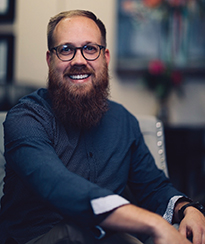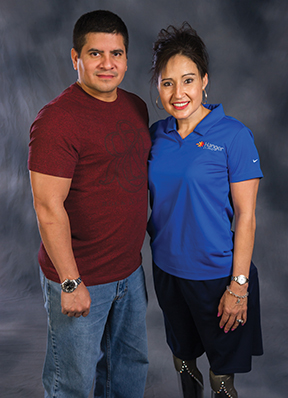By Rene Agredano
Days after a reckless DUI driver crashed into Yvonne Llanes and severed her legs, the young mother of four was distraught about her future as a double amputee. It was summer 2005, and Yvonne didn’t want to be a burden to anyone, especially to her husband, Daryl. “It’s okay if you want to leave,” she told him while he stood at her bedside. Splitting up was inconceivable to them at the time, but eventually, they separated. Doctors saved her life, but she and Daryl were the only ones capable of resuscitating their marriage.
The Llanes’ estrangement isn’t unusual. Studies about marital dissolution show that divorce rates skyrocket among couples suddenly faced with a serious injury or chronic illness. These figures soar even higher if the wife is affected by the condition. When the balance in a marriage or partnership drastically shifts to one person, feelings of guilt, resentment, and anger predictably surface and may damage the relationship. And as Yvonne and Daryl soon discovered, the willingness of both parties to step into vulnerability is the first move toward reconciling.
Before her bilateral above-knee amputations, Yvonne lived a hectic life as an assistant elementary school principal in Yuma, Arizona. Like most moms, she worked, managed a home, and shuttled her kids to school and other activities while Daryl worked long hours as a Marine Corps recruiter. Their marriage was strong, but limb loss put it to the test when she fell into a deep depression that lasted almost ten years.
“I didn’t know how I was going to be a good wife, and I didn’t know how I was going to be a good mom,” says Yvonne. “For a long time, I couldn’t cope. I sat in my wheelchair and was so depressed. I was thinking about all these things, and I was thinking about them so much. I knew deep down that I wasn’t going to be able to do those things like I did before. It just really sunk me deeper and deeper into that dark abyss, and I couldn’t get out of it.”
Whenever Daryl tried to help, she pushed him away and lashed out with anger. “I would just blow up and get mad. I would say, ‘You’ll never understand, so why should I tell you? You have your legs—I don’t. It doesn’t matter what I say, you’re never going to understand.’ I felt like he couldn’t relate to me anymore because he was able-bodied, and I wasn’t.”
Her husband’s grueling work schedule left little time for meaningful conversations or connections. Yvonne’s unwillingness to share her emotions didn’t help either. “When he would come home, it was late, he was tired, I was tired,” she recalls. “I was dealing with my new lifestyle, and I hated it. It was difficult to talk about.” They drifted into separation three years after the accident.
Communication difficulties are a major struggle that even the best relationship will endure after amputation surgery, according to Robert W. Mouser, a licensed Oklahoma therapist specializing in grief and trauma. As the father to a young child with an amputation, he can relate. “It comes down to, ‘I don’t know what to say, so I say very little,’” he explains. The able-bodied person may be afraid of saying the wrong thing and destroying the new amputee’s fragile self-esteem. The amputee may be too proud or afraid to ask for help, which further degrades communication and, ultimately, the relationship.

“It’s hard to acknowledge, ‘Yeah, I can’t do that,’ when last week I may have done that,” says Mouser. Most people don’t plan for amputations and don’t plan on all the emotional stress that comes along with shifting roles in the relationship. For it to survive, both partners must be willing to talk honestly about their feelings, without blame or accusations. “It’s a new learning experience that you have to adapt to as it happens,” he says. “It takes a lot of grace to find that balance.”
IT STARTS WITH A CONVERSATION
Neither Yvonne nor Daryl wanted to divorce, but they weren’t sure how to avoid it. They considered counseling but decided to try to talk things out before seeking outside help. Yvonne still recalls the details of that first discussion.
“We really sat and listened to each other’s feelings. We cried. We told each other the truth, no matter how hard it was going to hurt me, no matter how hard it was going to hurt him. We sat and we let it all out,” she says. It was the first time that Yvonne learned that Daryl was experiencing his own post-amputation grief. “It wasn’t just your accident—it was mine too,” he confided. It hurt when well-intentioned friends and family asked about Yvonne’s condition but not his. He says nobody seemed to care about how he was coping. “I know that the accident happened to you and you’re the one that lost your legs, but I was going through it too,” he said. “And it felt like I was a nobody.”
When communication channels close, relationship partners easily miss clues to emotional struggles eroding a relationship. “Our marriage went through a very rough and horrific journey because we just didn’t communicate,” says Yvonne. “When we separated and came back together, he and I both realized that we were going to have to communicate and tell each other our true feelings, even if it hurt the other person. Whenever he would say something or do something that would bother me, I would let him know and vice versa.” It wasn’t easy, and still isn’t, but now their relationship is stronger than when they married 20 years ago.

HONESTY IS EASIER THAN DIVORCE
The Llanes did exactly what experts recommend. “Some people may need extra help with a social worker or a therapist, which is fine,” says Carla Vollmer, an amputee and limb loss support coordinator for the University of Michigan Orthotics and Prosthetics Center’s Community Amputee Network. “But having the discussion first and having both people just say how they feel helps start the conversation.” In support groups and educational classes she organizes, Vollmer says that most partners aren’t aware of one another’s post-amputation emotional struggles. Mutual feelings of guilt, inadequacy, and anger erode the relationship until one partner makes the first move toward honesty. For many, individual or group therapy will boost self-esteem enough to get started.

Yvonne found self-confidence and a way out of depression when she enrolled in a Hanger Clinic amputee bootcamp, four years after reconciling with Daryl. Once surrounded by positive, happy above-knee amputees who mastered their prostheses and enjoyed rich, full lives, Yvonne ditched her wheelchair and learned to tackle communication challenges in her marriage. “Just seeing amputees walking and living a normal, everyday life—that was enough therapy for me,” she says. “I just needed to see somebody in action—I needed that positivity and support.”
The experience trans-formed her life and her marriage. Today she is a Hanger Clinic ambassador, competitive athlete, motivational speaker, and board member of the San Antonio Amputee Foundation. Daryl is retired from the military and coaches Yvonne while they work out together. He provides adaptive exercises to amputees and their families through the San Antonio Amputee Foundation and to many Hanger Clinic patients. Together they share a mission to show other amputees and families that meaning and purpose are still obtainable. “When you’re both involved in each other’s lives, it helps to see what that person is going through, the challenges that person has, and how to help them,” she says.
WHERE TO FIND SUPPORT
Many amputees and caregivers learn to tackle relationship challenges through a group or individual therapy setting. Your medical clinic’s social worker can connect you to help, such as:
AMPUTEE AND CAREGIVER SUPPORT GROUPS. The person-to-person support available in real-world settings can be life-changing. “The support group helps by providing a safe environment to share thoughts and feelings that people have otherwise kept inside,” says Nicole Henry, a certified prosthetist and orthotist who leads the amputee support group at Zuckerberg San Francisco General Hospital. “Sometimes just sharing and practicing talking about issues that are typically difficult to discuss can have a great impact.”
ONE-ON-ONE PEER MENTORING. When a group environment feels too overwhelming, it may be easier to make a personal connection with another amputee who understands your experience. Like many clinics for amputees, Henry’s has certified peer visitors who volunteer their time to meet with patients. They have also been trained in how to navigate sensitive conversations.
ADDITIONAL SUPPORT. More support can be found at the Amputee Coalition Support Group Network (https://bit.ly/2rYa1FY) and the Amplitude support group directory (www.livingwithamplitude.com/support-groups). You can also try an internet search for “Amputee Support Group in (your city).”
While this informal type of assistance may work for many, others may want to consider seeking in-person or online professional marriage counseling. For more information to help you determine if you need professional assistance, visit https://cle.clinic/369gjAH.
TOP IMAGE: stasknop/stock.adobe.com



